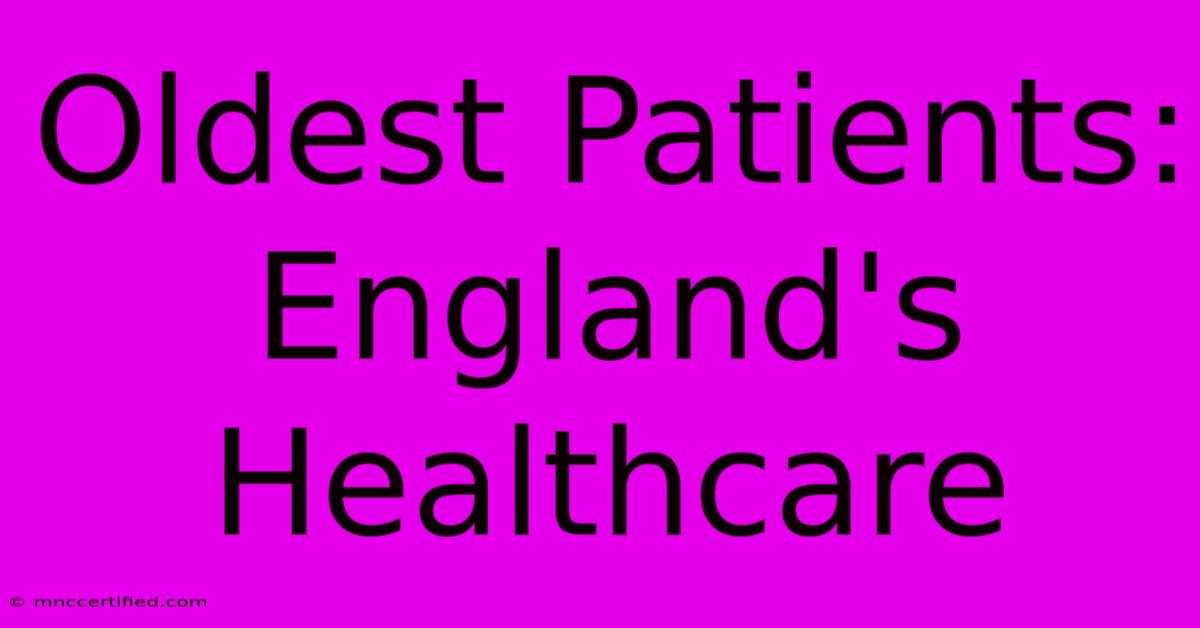Oldest Patients: England's Healthcare

Table of Contents
Oldest Patients: Navigating England's Healthcare System
England boasts a growing elderly population, placing increasing demands on its National Health Service (NHS). Understanding the specific healthcare challenges faced by the oldest patients and the support systems available is crucial for both individuals and caregivers. This article delves into the complexities of healthcare for England's oldest patients, exploring key aspects from access to care to specialized services.
Accessing Healthcare: Challenges and Solutions
The NHS provides universal healthcare, but accessing appropriate care for the oldest patients often presents unique hurdles. Geographical location plays a significant role; those in rural areas may experience longer wait times for appointments and access to specialized services compared to urban dwellers. Cognitive impairment can also complicate access, requiring additional support from family members or carers to navigate appointments and understand medical information.
Transportation is another significant barrier. Many older adults lack reliable transportation, hindering their ability to attend appointments and access essential services. The NHS offers various transportation options, but awareness and access to these services vary widely. Financial constraints can also impact access, particularly for those with limited incomes who may struggle to afford prescriptions or other out-of-pocket expenses.
Overcoming Access Barriers
Several initiatives aim to improve access to healthcare for the oldest patients. These include:
- Integrated care systems (ICS): These systems are designed to improve coordination between health and social care services, streamlining access to a wider range of support.
- Community-based services: Increased investment in home care, telehealth, and community-based healthcare services helps bring care closer to home, reducing the need for travel.
- Care navigation services: These services offer personalized support to help older adults navigate the healthcare system and access appropriate services.
- Advanced care planning: Encouraging individuals to discuss their preferences for end-of-life care ensures their wishes are respected and reduces the burden on the healthcare system.
Specialized Care for the Elderly
England's NHS offers various specialized services for elderly patients, addressing specific health needs and promoting healthy aging. These include:
- Geriatric medicine: This specialty focuses on the unique healthcare needs of older adults, often dealing with multiple complex conditions.
- Palliative care: This focuses on providing comfort and support for individuals with life-limiting illnesses, improving their quality of life.
- Dementia care: Dedicated services cater to the specific needs of individuals with dementia, offering support for both the patient and their caregivers.
- Rehabilitation services: These services aid recovery after illness or injury, helping older adults regain independence and improve their quality of life.
The Role of Carers and Family Support
Carers play a vital role in supporting the oldest patients in England. The level of support needed varies greatly depending on the individual's needs, but often includes assistance with daily living tasks, medication management, and emotional support. The NHS offers various support services for carers, including:
- Carer's assessments: These assessments identify the needs of carers and ensure they receive appropriate support.
- Respite care: Temporary care breaks allow carers to rest and recharge, preventing burnout.
- Training and education: The NHS provides training and education to help carers manage the challenges of caring for an older adult.
Improving Healthcare for the Elderly: Future Directions
The NHS continually strives to improve healthcare for the oldest patients. Key areas of focus include:
- Technological advancements: Utilizing telehealth and remote monitoring technologies to improve access to care and reduce hospital readmissions.
- Prevention and early intervention: Focusing on preventative measures to improve overall health and prevent age-related diseases.
- Investing in the workforce: Training and recruiting more healthcare professionals specializing in geriatric medicine and related fields.
- Improved data collection and analysis: Utilizing data to identify areas needing improvement and optimize the delivery of healthcare services.
Addressing the healthcare needs of England's oldest patients requires a multifaceted approach encompassing improved access, specialized services, strong carer support, and ongoing investment in healthcare infrastructure and technology. By focusing on these key areas, the NHS can strive to provide high-quality, person-centered care for its aging population. This will not only improve the lives of older adults but also alleviate the burden on the system itself, ensuring sustainable and equitable healthcare for all.

Thank you for visiting our website wich cover about Oldest Patients: England's Healthcare. We hope the information provided has been useful to you. Feel free to contact us if you have any questions or need further assistance. See you next time and dont miss to bookmark.
Featured Posts
-
Daily Trauma Firefighters Face Explosion Aftermath
Nov 20, 2024
-
Is Self Storage A Good Investment
Nov 20, 2024
-
Check Cold Weather Payment Eligibility
Nov 20, 2024
-
Shelter Insurance Lawrenceburg Tn
Nov 20, 2024
-
California Investment Real Estate
Nov 20, 2024